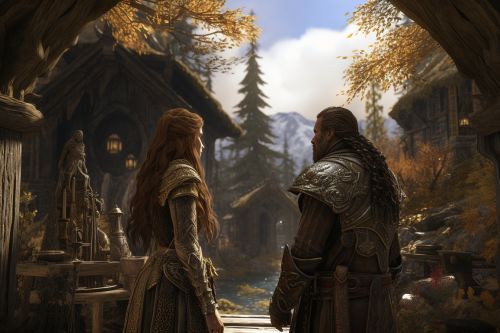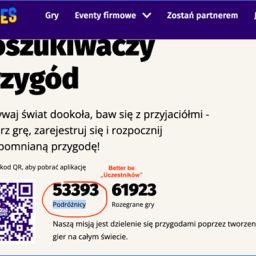

It may not seem that crucial, but languages play a pivotal role in video game development, going far beyond mere communication and influencing the very essence of the gaming experience.
From the programming languages that have shaped the game’s foundation to the diverse languages players use to communicate, here we delve into the multifaceted realm of video game linguistics.
Contents
Real-life languages used in video games
Starting with the languages that are the most commonly used, such as English, we need to consider that every game needs a way to relay its content and communicate with the player. While we probably could find some games that are without any text or spoken words, it would be highly unusual for the video game industry as we know it today. This means developers always have to make a conscious choice in terms of what language they intend using to bring their ideas to life.
What languages are video games written in?
In crafting the narrative, dialogues, and characters of video games, the choice of language is a multifaceted decision guided by various considerations. The primary choice often revolves around the target audience, by the need to align with the demographic the game seeks to engage. With English being so widely spoken, it is often the first choice for most games developed by Western studios. Japan is also a prominent gaming market, and their domestic game studios prioritize the Japanese version for their product, which has to be then localised into English.
The proficiency of the development team in a specific language can significantly influence this decision, promoting efficiency and accuracy during the creative process. For instance, the international hit Cyberpunk 2077, developed by Polish studio CD Projekt RED, was originally written in Polish, even though the domestic market was not the main focus for the game. Additionally, the thematic elements and setting of the game also play a pivotal role: titles that are set in distinct historical or cultural contexts may adopt languages that authentically reflect those environments. For games aspiring to a global appeal, then multiple languages are usually included, allowing for a diverse audience. Furthermore, the narrative style and genre contribute to language choices, ensuring that the linguistic subtleties complement the overall gaming experience. As the gaming industry continues to embrace inclusivity, developers often collaborate with professional translators and localisation experts to accurately convey the intricacies of the story and dialogues in various languages, ensuring a truly immersive and accessible global gaming adventure.



Localisations of video games
Once a game has been developed, the next step is often to make it accessible to a global audience through translations. The decision concerning which languages to translate the game into is influenced by meticulous market research, understanding the player demographics, and the need to strive for global appeal.
The choice of languages for game translations goes beyond mere accessibility, as it profoundly impacts the player’s experience. Imagine a meticulously crafted narrative, rich in cultural references and humour, losing its essence in translation. Language choice becomes a conduit for preserving the emotional depth and immersive qualities of the original game. Players should feel a connection to the characters, understand the narrative, and experience the intended emotional impact. The right language choices ensure that players, regardless of their native tongue, can fully engage with and enjoy the game, fostering a sense of inclusivity and cultural appreciation.
In essence, the art of translating video games is a delicate balance between linguistic expertise, cultural acumen, and the desire to offer a universal gaming experience. It is this commitment to bridging the language gaps that helps to transform the game from a localised entity to a global phenomenon, with a tapestry of diverse languages woven seamlessly into the game’s narrative.
Languages spoken in online video games
Video game characters are not the only ones using language, as the players themselves want or even need to communicate during most online video games. The question is what language should they use? It could be their native language when playing with friends, but what happens when there are game teams based on strangers from across the world?
English is often a prevalent language in many online games, given its widespread use and the international nature of the community. However, the actual language used can differ based on factors such as the game’s popularity in specific regions, local culture, and the demographics of the player base.
In some cases, games with dedicated servers for specific regions may see more localised communication in languages like Japanese, Korean, Mandarin, Spanish and so on, depending on the region. Popular multiplayer games often attract a diverse player base, leading to a mix of languages used on the global servers.
Additionally, gaming communities may develop their very own language, lingo, jargon, or a hybrid language influenced by the cultures, regardless of the players’ native languages.



Languages created for video games
Talking to characters and understanding what they are saying is a large part of many video game genres. However, some titles go a step further, supplementing or even forgoing natural languages, and creating complex made-up languages in order to establish even more immersive worlds. Here are few projects that went through the effort of coining fictional languages.
The Sims – Simlish language
Simlish may not be one of the most complex languages created for a video game, but it surely it is one of the most recognizable and charming. There is still a ton of personality in the squiggly sounds used by Sims to talk. There are even covers of famous songs in Simlish recorded for the in-game radio stations.
The Elder Scrolls – Dovahzul dragon language
This is a fictional language that also has huge gameplay implications. Traversing the world of Skyrim, the player character can discover words of power in the language of dragons – Dovahzul. The words by themselves conjure powerful abilities when spoken, but to decipher their meaning it is necessary to consult their native draconic users.
Nier – Chaos language
When listening to the score of the game, you may notice that it is sung using seemingly meaningless sounds, which are at the same time strangely familiar. This is because the intent was to create an illusion of modern languages that have blended into an incoherent, indecipherable dialect over the millennia that have passed.
Languages in Ico
In Ico the two main characters speak different languages. The dialogues of the character outside the players’ control are represented by a runic language, which has a symbol for every letter of the English alphabet. The lines can be translated by establishing the first letter for every symbol in a sentence, followed by reversing the order of the letters and filling in the missing vowels.
Final Fantasy – Al Bhed
Final Fantasy X introduced its own language, and expects players to learn it using the Al Bhed Primers, which are ciphers scattered all over game’s world. Each of them allows the translation of one letter of the Al Bhed alphabet.



Programming languages for games
Natural languages are one thing, and they are required both for playing video games and developing them. The actual game programmers need to have great command of the game programming languages. A programming language is a tool that essentially allows programmers to write code or a series of instructions, to make computers perform tasks or to solve problems. Each programming language has its strengths and is suited to different types of tasks, making them versatile tools for creating a wide range of software and different applications. Programming languages have their own syntax and rules, similar to the grammar in natural languages. These rules help translate human-readable code into machine-executable instructions. Most video games are created using one of the several programming languages listed below.
C++
In the realm of game development, C++ reigns supreme, renowned for its versatility and efficiency. It serves as the backbone for a myriad of popular games, from intricate, resource-intensive titles to lightweight indie creations. The language’s capacity for low-level memory manipulation and high-performance computing makes it a go-to choice for developers seeking optimal control over hardware resources.
C#
C# has carved its niche as powerful and more accessible version compared to C++. Particularly associated with the Unity game engine, C# provides developers with a balance of performance and ease of use. Its syntax resembles other C-based languages, facilitates a smoother learning curve, and attracts both seasoned developers and those new to the craft.
JavaScript
JavaScript, synonymous with web development, has transcended its original domain to become a noteworthy player in game development, particularly within the browser-based gaming sphere. Its compatibility with HTML5 and CSS has facilitated the creation of engaging and interactive games accessible directly through web browsers.
Java
Java, with its platform independence and robust ecosystem, has found its place in the diverse landscape of game development. Often utilized in mobile game development, Java’s flexibility extends beyond the traditional desktop environment. As the backbone for Android games, it plays a crucial role in bringing mobile games to a vast array of devices.
Lua
Lua, a lightweight scripting language, has found favour around mobile game developers, where it is appreciated for its simplicity and versatility. Frequently embedded in game engines as a scripting language, Lua enables game developers to implement in-game customization, from altering character behaviour to creating dynamic in-game events.
Python
While Python may not be the first choice for resource-intensive AAA titles, its simplicity, readability, and versatility have positioned it as a prominent language in indie game development. Python’s application extends beyond the game’s core logic, with its use in tools, scripts, and even server-side components, all contributing to a holistic game development ecosystem.
In the end, there is no best programming language, each of them is just a tool and the choice depends on which one gets the job done well.
Learning languages with video games
Playing games can significantly aid language learning by providing an engaging and immersive environment. Games often incorporate interactive elements, challenges, and real-world scenarios that encourage active participation and the application of language skills. Whether through dialogue interactions, quest narratives, or in-game communication with other players, games offer practical opportunities to practice vocabulary, grammar, and pronunciation. The dynamic and enjoyable nature of gaming enhances motivation, making language learning a more enjoyable experience. Exposure to diverse linguistic contexts within games contributes to cultural understanding and context-specific language acquisition, making gaming an effective and enjoyable supplementary tool for language learners.
The synergy between video games and language learning has become increasingly evident, offering a gamified approach to acquiring new languages. Language learning apps and game-based language courses leverage the interactive and immersive nature of gaming to make language acquisition both more enjoyable and effective. Players engage with linguistic challenges, earn rewards, and progress through levels, turning the language learning process into a dynamic and personalized adventure.
Translate your video game with Skrivanek
As experts in all manner of translations, our team can ensure that your gaming masterpiece resonates with a global audience. Break down the linguistic barriers, unlock new markets, and elevate your game to international success with video game localisation. Contact Skrivanek today, so we can embark on a journey to create games that captivate audiences across diverse linguistic landscapes.
Images generated by AI.















